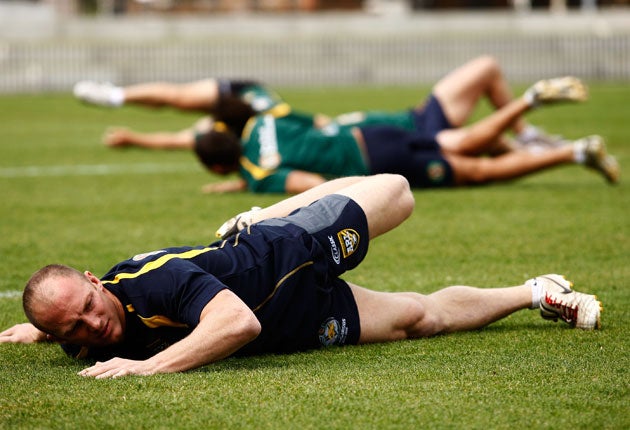Pesky Kangaroo who won't be tied down
Lockyer, the nemesis of GB and now England, is still not ready to call it quits

Your support helps us to tell the story
From reproductive rights to climate change to Big Tech, The Independent is on the ground when the story is developing. Whether it's investigating the financials of Elon Musk's pro-Trump PAC or producing our latest documentary, 'The A Word', which shines a light on the American women fighting for reproductive rights, we know how important it is to parse out the facts from the messaging.
At such a critical moment in US history, we need reporters on the ground. Your donation allows us to keep sending journalists to speak to both sides of the story.
The Independent is trusted by Americans across the entire political spectrum. And unlike many other quality news outlets, we choose not to lock Americans out of our reporting and analysis with paywalls. We believe quality journalism should be available to everyone, paid for by those who can afford it.
Your support makes all the difference.The bad news for England is that they might not have seen the last of their nemesis, Darren Lockyer, even after this year's Four Nations.
Lockyer, captaining Australia in their match against the old enemy in Melbourne this morning, has seemed to haunt British sides ever since his Test debut in 1997. It sometimes seems that all of his record tally of 34 tries for his country have been timed to deny Great Britain or England victory.
"There have been some memorable ones," he says. "I suppose the 2003 series, where we were losing in the first and third games and I scored late tries in both, that stands out. The other one I remember was the one against New Zealand in injury time in the 2006 series."
Lockyer is unlikely to rank the scruffy close-range try he scored against Papua New Guinea at Parramatta last week as one of his most memorable or significant efforts, but it did enable him to beat Ken Irvine's 40-year-old Australian Test record for tries – much to his relief.
"It had been talked about for so long, I was just pleased to get it out of the way and move on," he says, with the air of a man who has alwaysdisliked the fuss that goes with being the world's best player. But moving on does not necessarily mean moving out.
At 33, Lockyer's impending retirement has been discussed for several seasons, if only because it is recognised that he is going to be so difficult to replace. He was widelyexpected to announce the end of his Test career after the Four Nations last year. This time, he is still around, still an automatic selection and still not sure that the time has arrived.
"Last year, I thought it would probably be my last, but I worked very hard through the pre-season and built up my fitness," Lockyer says. "I'm still feeling pretty good, so I might have another one in me."
It all amounts to one of the great rugby league careers, or rather two careers, because it tends to be forgotten that Lockyer was as good a Test full-back as the game has ever seen before he was controversially transformed into a stand-off.
Sceptics who said that he would not be able to make that transition have long since eaten their words, but that switch explains why he takes a special interest in a young player in opposition today whose career might be heading in the opposite direction.
Sam Tomkins began with Wigan as a teenage stand-off, before being successfully switched to full-back halfway through last season. He started the Four Nations at scrum-half against the Kiwis, but was named at full-back against Australia.
"I played against him in the Four Nations last year," Lockyer says. "He was a very young player then, but he did some very good things. He's a bit different and very dangerous."
Despite his own progression in the opposite direction, Lockyer does not believe that being turned into a full-back by club and national coaches will do Tomkins any long-term harm. "At this stage of his career he might get more freedom there," he says.
Twelve years his junior at 21, Tomkins is one of a crop of young English players Locker believes are capable of actually winning big games, rather than coming frustratingly close until a player of his calibre – or New Zealand's Benji Marshall – snatches the prize away.
Of the side that took the field against Australia today, only Gareth Ellis, Ben Westwood and Stuart Fielden are around the 30 mark. "England have some really good individuals," Lockyer says. "They just need to put it all together for 80 minutes."
He will get no argument on that from the England coach, Steve McNamara. He has been keen all week to cast off any depression over last week's performance in favour of the determined cheerfulness of long-term optimism. "It's a very young team," says McNamara. "Obviously we want to do well in this tournament, but the experience that players are getting here will stand them in good stead for the future. It's good news for next year's Four Nations, but it's good news for the World Cup in 2013 as well."
And, somewhere down the line, they could be part of an England team that doesn't have to contend with Lockyer. He just isn't quite ready to say when that might be.
Join our commenting forum
Join thought-provoking conversations, follow other Independent readers and see their replies
Comments